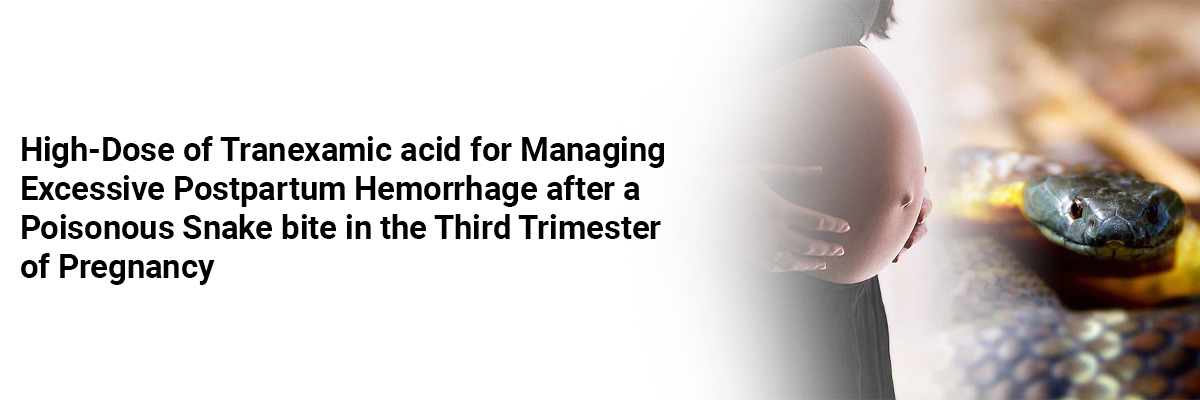
 IJCP Editorial Team
IJCP Editorial Team
High-Dose of Tranexamic acid for Managing Excessive Postpartum Hemorrhage after a Poisonous Snake bite in the Third Trimester of Pregnancy
A 27-year-old pregnant woman presented with pain, swelling, and bleeding
from her left foot and reduced fetal movement after enduring a snake
bite.
The lady was 30 weeks pregnant and had had four pregnancies with three
live births in the past. Two of her living children did not require antenatal
care. The snake was unidentified.
On examination, she was conscious and stable. Two bite marks were
observed on the sole of her left foot, spaced 2 cm apart. There were no signs
of spontaneous bleeding or neurotoxic envenomation. Abdominal examination
indicated a uterus size of 28 weeks, but fetal heart sounds were not
detectable.
Initial coagulation tests showed abnormalities, and ultrasonography
confirmed intrauterine fetal demise.
Treatment involved the administration of polyvalent anti-snake venom
along with conservative measures. The patient received 17 units of fresh frozen
plasma over ten days for coagulopathy, but her condition did not improve.
Regular laboratory tests, vital sign monitoring, and clot retraction
tests were performed. She spent ten days in the Medical Intensive Care Unit
(MICU) and eventually went into labor, delivering a macerated stillborn baby
weighing 2.1 kg. Postpartum hemorrhage, which was unresponsive to traditional
methods, occurred despite a fully retracted uterus and the exclusion of
traumatic causes.
Aggressive treatment included high-dose tranexamic acid, blood products,
and intravenous fluids, which led to the cessation of bleeding within 10
minutes of the bolus tranexamic acid dose. Further administration of blood
products stabilized her condition, and her coagulation profile improved.
Snake bites during pregnancy, particularly in the third trimester, carry potential risks to the mother and fetus. Early diagnosis, prompt medical intervention, and access to anti-snake venom, along with comprehensive care, are crucial in managing such cases and preventing adverse outcomes for both the mother and the fetus.
Source: Das D, Baidya JL. Indian Obstet Gynaecol. 2023
Apr 1;13(2).

IJCP Editorial Team
Comprising seasoned professionals and experts from the medical field, the IJCP editorial team is dedicated to delivering timely and accurate content and thriving to provide attention-grabbing information for the readers. What sets them apart are their diverse expertise, spanning academia, research, and clinical practice, and their dedication to upholding the highest standards of quality and integrity. With a wealth of experience and a commitment to excellence, the IJCP editorial team strives to provide valuable perspectives, the latest trends, and in-depth analyses across various medical domains, all in a way that keeps you interested and engaged.





















Please login to comment on this article